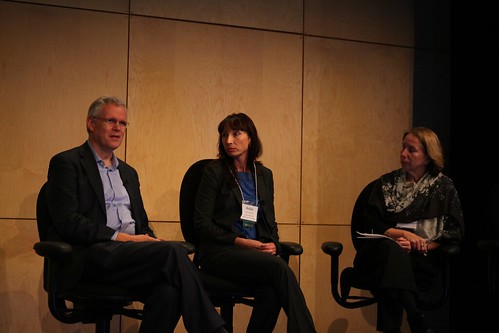Heavy Bombing Campaign In Lao Leaves Scars, Live Munitions
Posted on November 20, 2010.
Xieng Khuang Province, Lao PDR – Looking down from a window of our airplane, I see that the lush green landscape of the high plateau is pockmarked with brown craters, still empty of vegetation more than 30 years after they were made.
These are the scars of the U.S. government’s nine-year-long “secret” bombing campaign over this small, landlocked country that borders Vietnam to the east. U.S. bombing records show that over 20,000 missions involving the release of roughly 46 million cluster munitions occurred over Xieng Khuang Province.
The area was of strategic importance as the Ho Chi Minh Trail, used by North Vietnamese forces with the consent of Lao revolutionary forces to send supplies and personnel around the de-militarized zone in central Vietnam, cut through Xieng Khuang’s forests and mountains.
Six groups of foreign delegates, diplomats and representatives from international nonprofit organizations visited the province and a number of unexploded ordnance (UXO) clearance sites during the recent First Meeting of Sates Parties to the Convention on Cluster Munitions in Vientiane, the capital of Lao PDR. Three of us from Clear Path International, myself as communications director, our executive director and the manager of a program we’re starting here in Laos, were among the visitors.
CPI is a U.S.-based nonprofit organization that provides medical and socio-economic assistance to UXO survivors, their families and their communities in Southeast Asia and Afghanistan. In Laos, we are partnering with the Lao Women’s Union to provide low-interest loans to female heads of households in Xieng Khuang Province to finance home-based businesses.
Our funding for this and other programs comes from the U.S. Department of State Office of Weapons Removal and Abatement. During the convention, there was a good deal of discussion in side events about the United States not being a signatory to the convention, which establishes international law to ban the use, production, transfer and stockpiling of cluster munitions and mandates their destruction. To date, 108 countries have adopted the convention.
And while the US was without official representation, officials from the embassy here did attend many of the workshops. In September 2008, Secretary of Defense Robert Gates said the US has not participated in the convention because there are no good substitute munitions and that the “elimination of cluster munitions from our stockpiles would put the lives of our soldiers and our coalition partners at risk.”
Under the current policy issued by the Department of Defense in 2008, by the end of 2018 the US will no longer use cluster munitions with more than a 1 percent chance of not exploding upon impact. Of the estimated 3 million tons of bombs dropped on Lao soil, about a third failed to go off when dropped. They continue to claim lives, usually those of Lao children, long after the fighting ended.
It is the hope of the Cluster Munition Coalition, an international civil society campaign working to eradicate these weapons, and other INGOs including ours that the US will eventually join the treaty and ban their use altogether. President Barack Obama’s administration has not yet conducted a review of U.S. policy on cluster munitions, but Senators Patrick Leahy (D-VT) and Diane Feinstein (D-CA) along with 14 other members of the Senate have written to the president, urging him to conduct a thorough review of the national policy on the weapons.
The US has acknowledged use of cluster munitions in Afghanistan in 2002 and in Iraq in 2003. In June 2010, Amnesty International reported that it appears the US used cluster munitions in an attack on an alleged al-Qa ‘ida training camp in Yemen in December 2009, but neither the US nor Yemeni governments have responded publicly to the Amnesty International allegations.
Despite unwillingness by the US to completely abandon use of cluster munitions, it reportedly has been and will continue to be the largest contributor to UXO clearance and victim assistance here in Laos, having spent $51 million to date. In 2010, the US will have spent $5.1 million on UXO efforts by the year’s end, an amount that is expected to increase to $7 million for 2011.
During the visit to one of several clearance sites in Xieng Khuang, CPI staff and others witnessed – from a safe distance – the detonation of 36 cluster bombs. The blasts, timed to go off within minutes of each other, sent enormous plumes of smoke, dirt, stones and shrapnel into the pale blue sky and the explosions echoed off the surrounding hills.
Each time, I felt a thud deep in my chest. At one point, I exhaled deeply, not realizing I had been holding my breath, thankful that no lives had been lost, no injuries sustained – this time.
Heavy Bombing Campaign In Lao Leaves Scars, Live Munitions
Karen Matthee | Clear Path International | November 20
Closing Remarks and Conclusions
Posted on November 16, 2010.
Susan Jeffords and Bill Clapp wrapped up the conference with a discussion of next steps and reflections for future Global Washington Conferences.
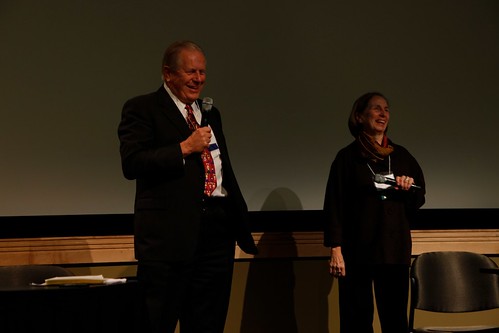
Jeffords voiced some key lessons for Global Washington, “people have different investments and priorities they bring to partnerships…[Global Washington] has an opportunity to construct places for these people to share these different stakes and articulate them.” She added that Global Washington can take a stronger role in facilitating these interactions and is also committed to helping small organizations have a voice in Washington DC among larger organizations while gaining access to larger types of partnerships. Also, Jeffords commented on the repeated theme of improving conditions for global women and girls. She asked, “that everyone should walk out of this room and think of how to incorporate a focus on women and girls in everything we do to really build up a better world.”
Clapp concluded, the “quality of the dialogue has been a step up from last year” and “this has been an extraordinary two days.”
Submitted by Nina Carduner
Assessing Our Impact: from Strategy to Implementation
Posted on November 16, 2010.
The panel discussion focused on the growing pressure in the development sector for effective monitoring and evaluation in measuring the successful impact of of programs from aid and relief work to development. Much of impact evaluation often doesn’t take into account the various challenges that successful implementation of programs face on the ground and the panel discussed the challenges as well as some best practices for large and small organizations to move forward with useful evaluation methods.
Moderator Jodi Nelson, of the Bill & Melinda Gates Foundation, opened the panel with a quote pulled from a recent news article asking, “how do we ask the do gooders to prove they really do good,” which underscores the growing need and desire to hold non-profits, NGOs, and aid programs accountable to their goals and good intentions. In the past, NGOs were thought to be exempt from traditional oversight, Nelson explained. “Intention alone was considered enough proof to prove they were accomplishing their goals.”
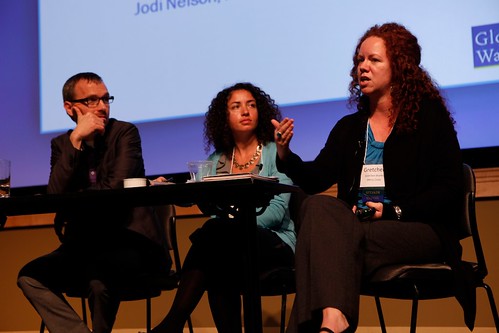
After fielding many questions from the audience, the panel took turns in the informal discussion. Holta Trandafili, of World Vision International, discussed the shift towards applying lessons learned in the past decades and how impact evaluation can help tailor future programs for more effective implementation and greater impact. There was some question in the audience about whether evaluation was important for small organizations, which Trandafili affirmed and emphasized the need to define the type of evaluation for each organization. She explained that it’s important for small organizations to focus on asking the questions, “can we actually measure our impact and when we do, what are we going to do with what we find?” Gretchen Shanks, from Mercy Corps, added that monitoring may be more efficient for short term programs like relief and crisis programs, while long term programs really do require more evaluation to stay in line with their missions and consistently respond to the data for improvement. One of the ways that Mercy Corps champions this is by looking at the “theory of change” that is motivating their programs. While there is not one set of tools that is ideal for community mobilization in these programs, continuous resource allocation, building in participatory channels for the communities that are being served, and monitoring processes are key.
Innovation was also discussed by the panelists. Many times, the funding environment for non-profits and NGOs does not create space for failure. The environment is competitive and the structure of funding and project cycles disincentivizes monitoring and evaluation. Shanks expressed, “we feel like we can’t talk about failure openly,” which makes innovation difficult. Nigel Biggar, of Grameen Foundation, shared that successful innovation will come when experimental programs require less cost and time to be evaluated. Doing so will enable ineffective programs to fail quickly without much cost, “so we can learn and build on those quickly,” and lead the way for more innovation.
Submitted by Nina Carduner
Trends in International Philanthropy
Posted on November 16, 2010.

Submitted by Pam Kahl
Steven Gunderson, President of the Council of Foundations and former WA-state congressman and Renee Acosta, CEO of Global Impact opened Day 2 of Global Washington. Steve highlighted the growth in global philanthropy, citing statistics such 300% increase in giving by Brazilians, $5.5 billion contributed in India in 2006 and the fact 800 new foundations have been established in China in the last five years. In addition to the financial statistics, Steve noted that overall philanthropy is taking a more central role in society. Younger generations are more focused on contributing to global issues than previous generations.
In the last five years the notion of philanthropy has evolved from competitive grant making to a focus on strategic investments – most recently with a focus on integrating with public and other private entities around common goals. As a result, many now look to philanthropy to lead innovation instead of the traditional drivers such as government and corporations. During the Q&A Steve made the key point that philanthropy and charity are not the same – charity is about passive periodic giving whereas philanthropy is about making strategic investments with multi-year commitments in mind.
Renee emphasized the importance of individual donors, noting that in the last three years individual donations represent 75% of Global Impact’s revenue. Global Impact stats also indicate that individual donors are more likely to give to a variety of organizations. Global Impact recognizes the importance of the giving sector acting as a knowledge-base to help donors make giving decisions. Renee closed by emphasizing the following:
No single tactic or giving challenge is as important as the quality of message and the ability to inspire and engage hearts and minds of donors.
Panelists:
Steve Gunderson, President Council on Foundations
Renee Acosta, CEO Global Impact
Moderator: Bill Clapp
Lessons Learned from Successful Private/Public Partnerships
Posted on November 15, 2010.
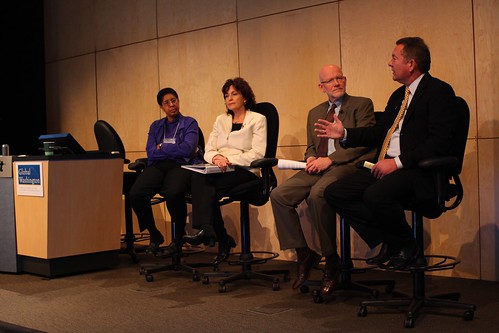
Submitted by Nina Carduner
Karen D. Turner, director at the Office of Development Partners for USAID, discussed how USAID pioneered the concept of public private partnerships in 2001. Yet, moving to partner with businesses has presented a challenge for USAID because often, the drivers for development are very different for private entities and there are many stakeholders to engage from social enterprises and diasporas to local and regional firms. USAID is here to facilitate partnerships. According to Turner, USAID has been successful in building public/private partnerships through internal education about how to meet the needs of the private sector and communicating with private sector about the internal workings of USAID. Both public and private enterprises need to understand the complexity of these partnerships and share with one another the best practices for making them transformational.
Rosemary Barker Aragon of Rotary International underscored the importance of understanding each partner’s area of expertise. For example, Rotary International is organized like a pyramid with the money at the top and many individuals on the ground at the local level in 200 countries. When entities approach Rotarians for partnership, they know they will excel at navigating effectiveness on the local level.
Christopher Elias of PATH discussed the ways in which PATH has successfully partnered with pharmaceutical companies around a common purpose. Uniting around a common purpose can add complexity to a partnership when the purpose relates to the core of a business’ product or service, yet this complexity also raises the level of engagement, which creates more leverage in the shared mission. Elias also credited “the rising awareness of global markets and systems for sustainable solutions” for the increasing the success rate of public/private partnerships. When public entities can recognize market changes, they can innovate and reinvent solutions that have prior success but are tailored to the differences between countries and regions.
NetHope’s Frank Schott gave praise to the expertise that private partnerships have have helped the non-profit achieve its mission to help facilitate the appropriate use of information and communication technologies in remote areas and during relief efforts. NetHope grew out of the resource pooling of seven non-profits. Pooling their resources enabled NetHope to attract private partnerships. He explained that, “while we use and appreciate [Microsoft and Cisco] products, the biggest contribution from them has been their expertise. Our supporters aren’t just donors, they are providing us with the technology, but more importantly, the expertise we need to leverage our programs and drive our mission.”
Global Development and the Future of Washington Jobs
Posted on November 15, 2010.

Submitted by Nina Carduner
Rogers Weed gave the closing keynote for the first day of the Global Washington Conference. As the director of the Washington State Department of Commerce, he summarized the current status of Washington’s economy as well as the increasing importance of global development for growing and improving the state of jobs in Washington.
After losing 3 million jobs in a period of 6-9 months, Washington has been hard hit by the recession. While the state is now gaining in employment, it is doing so very slowly. In Washington, the highest unemployment rates exist in the NE and SW counties of the state. The governor has been forced to make deep budget cuts and the state budget is in crisis. A big chunk of this budget is protected by the state constitution, which is focused on K-12 education and this limits flexibility. Unfortunately, the latest election results have squashed efforts to create opportunities for new revenues with sale taxes.
Weed did offer some good news for the state. Global trends including prevalence of software, the clean energy transition, and also the increasing influence of Asia are set to disproportionately benefit Washington. Thanks to the abundance of international non-profits and the general growth of development organizations in the state of Washington, Weed explained the development sector will enable Washington to achieve its goals of increasing international exports, study abroad programs, and building a broader international agenda. Meeting these goals, Weed stressed, will be essential for improving and growing jobs for the state and improving our local economy.

Why Wait? How Youth are Affecting International Development
Posted on November 15, 2010.
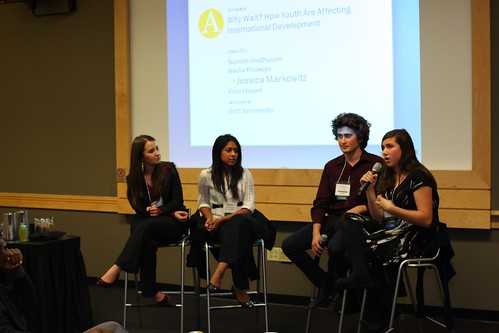
Submitted by Melissa Bird-Vogel Wilkes
Highlighting the emerging role of youth in international development, this panel offered insight into best practices, challenges and the future impact of youth involvement in finding solutions to global social and economic issues. Four young leaders who hold senior level or founder positions at Washington-based organizations lead the conversation.
Key takeaways from the conversation were:
– These young people are doing great things and bring a lot of new enthusiasm to the development community. The underlying voracity for social connection made possible through technology provides a unique opportunity to encourage others to contribute and helps build momentum behind projects and share new ideas. Additionally, the ability to for those young philanthropists to engage directly with potential beneficiaries through technology, increases awareness and fosters passion for making a difference.
– Lack of experience can be a challenge. As a result there is a need to find ways to integrate young people’s enthusiasm with institutional knowledge, so that new ideas thrive by leveraging best practices. For example, Jessica Markowitz, founder of Richard’s Rwanda, a local NGO has a board of older development experts who provide historical perspective.
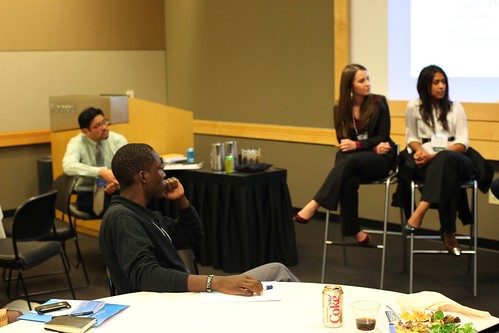
Notable quotes from the conversation:
“We’re making things an EXPERIENCE and bringing it to the individual vs. making the individual come to us.”
“Our demographic grew up on Facebook, growing up on Twitter now, and utilizing mobile applications. It’s happening in general in the sector, but it’s really on the forefront of our organizations.”
“Crowd-sourcing is a huge advantage in solving problems- a tool that can help someone find the best hotdog in San Francisco can also be used to find the best loan in Ghana.”
Panelists:
Jessica Markowitz, Founder, IMPUWE/Richard’s Rwanda
Cole Hoover, Outreach Coordinator, Lumana Credit
Nadia Khawaja, Co-Founder & COO, Jolkona Foundation
Nandie Oothuizen, Founder & Executive Director, Hand and Heart Now
Moderater: Britt Yamamoto, Executive Director, iLEAP
Ensuring Environmental Sustainability: Stories of Successful Partnerships
Posted on November 15, 2010.
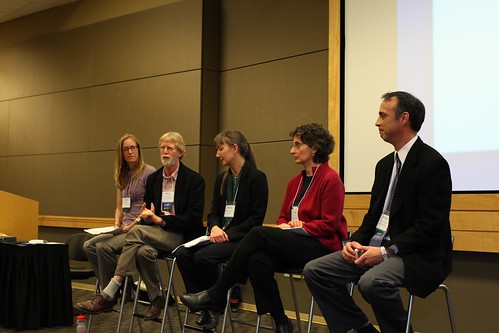
Submitted by Sarah Mosely
Moderator Dr. Lisa Graumlich of the University of Washington’s College of the Environment led discussion with these well-informed panelists, practitioners affiliated with notable organizations – such as Seattle University, the Woodland Park Zoo, The Nature Conservancy, Water for Humans and Water 1st International – doing work to improve quality of and access to water, sanitation and conservation programs in communities throughout the developing world. Panelists discussed achieving sustainable and scalable results from their programs stems from a common set of activities: strong local partnerships; working with governments at the local level; gaining trust within the communities; and strengthening systems for monitoring, evaluation and communication, which is at the core of the work discussed. The panelists largely agreed that major challenges they all face include: a difficult economic environment; lack of sustained funding; chaos caused by redundant organizations working in the same areas; and first-world behaviors, namely consumerism. Overall, the panelists detailed their thoughtful approaches to program planning and implementation, and stressed that strong partnerships with local actors and government have been vital to success.
Panelists:
Kari Vigerstol, Hydrologist, Freshwater Program, The Nature Conservancy
Rick McKenney. Exec. Director, Water for Humans
Marla Smith-Nilson, Founder & Executive Director, Water 1st International
Lisa Dabek, Senior Conservation Scientist, Director of the Papua New Guinea Tree Kangaroo Conservation Program, The Woodland Park Zoo
Phillip Thompson, Engineers Without Borders and Associate Professor and Chair, Environmental and Civil Engineering, Seattle University
Moderator: Lisa J. Graumlich, Dean and Virginia Bloedel Professor, College of the Environment, The University of Washington
Investing in Women and Girls – Access to Rights and Resources
Posted on November 15, 2010.
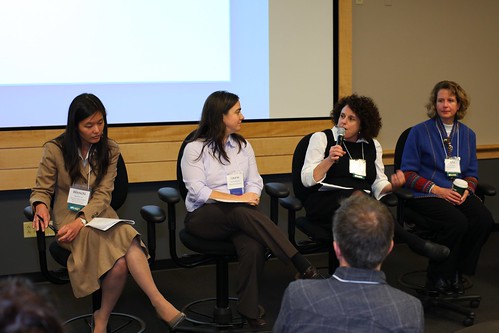
Submitted by By Yvette Gerrans
Just after lunch, and 100+ women and a minority of men drift in with expectation. We’re wanting to talk about investing in women and girls—why it’s needed, why it works, and how to do it well. Sessions like this have always felt like a long-distance meeting of “the sisterhood” to me, we women talking about women.
Geeta Rao Gupta (Bill & Melinda Gates Foundation) brings strength, warmth, humor and credibility in her opening comments. She talks about how women’s status depends on capabilities (health, education, nutrition), opportunities (economic, political), and concerns about safety (whether they’re actually beaten, or fear that they might be). “A lot of women live in fear of being physically beaten, and a lot of them make decisions about what they can and cannot do, and where they can and cannot go, based on that fear.” A few other stats that astound me but also project hope:
– Women do 66% of the world’s labor in return for less than 5% of its income.
– For every one year increase in education of women of reproductive age, child mortality has decreased by 9.5%. And, providing girls one extra year of education beyond the average boosts their eventual wages by 10-20%.
– A child’s probability of survival is increased 20% when household income is controlled by the mother rather than the father.
By now the room is full to overflowing, more chairs have been brought in, and we’re well on our way to a good discussion.
And a few highlights from the long and engaged conversation:
– Education for girls yes—but that’s not enough, and there’s a lot of poor education out there. What else is needed? Yes, you have to not only built the structure, but strengthen other elements as well. However, research in Northern Nigeria showed that girls who went to school—even if quality of schooling was bad, and they’d been there only two years, participated more in decision-making in the household than those who’d never been out of the home. In fact, not just school—those who had to step out of the home and go somewhere (to a community organization or wherever), used her power more in the home than those who didn’t. Of course that’s not enough, but start with what’s in front of you. Also, work at multiple levels. For example, in pursuing primary education nobody paid attention to what happens after primary education. So now parents are questioning why to give up labor of child to get the same job they would’ve anyway. So “do what you can” is partly correct, but also work at multiple levels.
– Often in past, construction of schools has been somewhat of an “edifice complex.” What about after that? It’s a challenge in working with community to develop internal things, maintain facilities. Ayni uses the metaphor that it “takes two hands to clap”—if the fund-raising happens without the other hand of community engagement, it will eventually stop. And vice versa. In one creative example in India, one organization worked with community around the question: Whose school-house is it? Government’s. Whose children go there? Now whose schoolhouse is it? On schoolhouse door, now have a paper that says: “This school-house will have: 8 benches, x chalk pieces, x slates, when is teacher to be absent / present.” So the community can now hold the government accountable, and they do.
– How do organizations “deepen” the conversation on these issues, especially about such personal / relational issues in the family. Can’t do it from outside. We talk about women’s empowerment—but we actually don’t empower women, they empower themselves. You can’t save the world. You can do a few things here and there to make it a better place, and hope that people take advantage of it. Can hear what they think is important and shift the resources a bit with whatever lever you have.
– Years ago, early in gender work we tried to get every individual in USAID or another agency to believe that women and girls were important. After years of trying to do that and failing, we finally decided we don’t really care what their attitudes are. Rather, we want them to see the importance of this issue to their work. In so many fora, men stand up and say: “I just want you to know, I treat my daughters and wife well.” This topic is somehow threatening to them. Geeta responds “Frankly, my dear, I don’t give a damn.” (channeling Ret Butler in Gone with the Wind). The point is, we’re here to help you do your work better, that’s it.
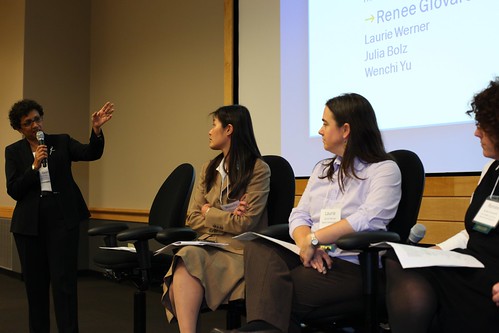
In closing, the final question Geeta posed to the panelists was “what do you want every individual in this room to do?”
– Julie: Write your senator or congressman and tell them to make it a priority for international aid development into things like education, land reform, microfinance—those fields that affect women.
– Renee: When you hear about projects, ask people: what does your project do for women?
– Laura: As you hear about projects, ask where’s it coming from? Is it being imposed or has the community bought in on it. Hear what the people want themselves.
– Wenchi: Listen and think how to raise the value of girls—since that’s the root cause of all discrimination against women and girls. How do we change the societal views?
– Geeta: 1) Convention for the elimination of all forms of discrimination against women is being heard in the senate on Thursday at 2pm, for the first since 2002. So go to: CEDAW2010.org and sign on. The US is one of 3-4 countries that hasn’t ratified CEDAW (along with Sudan, Libya, Somalia—that’s the company we’re keeping). 2) Give—of your time, expertise, and money. Choose an organization you adore, or a leader that’s struggling so hard but doing good work.
Panelists:
Julia Bolz, Founder and Board President, Ayni Education International
Renee Giovarelli, Director, RDI’s Global Center for Women’s Land Rights
Laurie Werener, Director of Program, Agros International
Wenchi Yu, Senior Policy Advisor, Secretary’s Office of Global Women’s Affairs, U.S. Department of State
Moderator: Geeta Rao Gupta, Senior Fellow, Bill & Melinda Gates Foundation
Setting the Context: “Global Development through Aid, Partnerships, Trade and Education”
Posted on November 15, 2010.
Stephen E. Hanson, professor and vice provost for Global Affairs, at University of Washington discussed the policy recommendations developed by Global Washington in partnership with experts in Washington State. They came up with four principles to increase U.S. foreign assistance effectiveness. These include: transparency and accountability to U.S. taxpayers and international beneficiaries; coherence and coordination across efforts and actors to ensure development goals are prioritized; local ownership of policies by those who will be most affected by them; and targeting populations most in need of aid. Hanson also stressed the need for “patient” metrics because global issues are enormous and their solutions are multi-generational. Most initiatives need time to achieve their goals as well as time for those achievements to be measured accurately.

These policy recommendations set the context for the panel on “The Changing Environment of International Development” where Sam Worthington, President & CEO of InterAction, and Anita Sharma of the United Nations Millennium Campaign discussed the challenges, their recommendations, and the current needs of effective public/private partnerships in global development.
Both panelists discussed the lack of funding and support for foreign aid in our current economic climate. While many governments have pledged aid to support the UN Millennium Development Goals, many have yet to make good on these pledges, explained Sharma, and there is a real need for non-governmental entities and constituencies to continue to support global aid efforts. The U.S. security budget would do well to include international development efforts as a matter of national security.
Worthington underscored the shift of foreign aid from economic assistance toward a focus on economic growth in developing countries. He stressed that the biggest challenge to aid, aside from fiscal constraints, is identifying governments who trust their populations to take part in planning their own development. Part of this development will have to come from private entities, which Worthington argued are more focused on the people who will receive assistance, whereas aid from government entities tends to focus first on the relationship with the nation-state before its people.
Submitted by Nina Carduner
